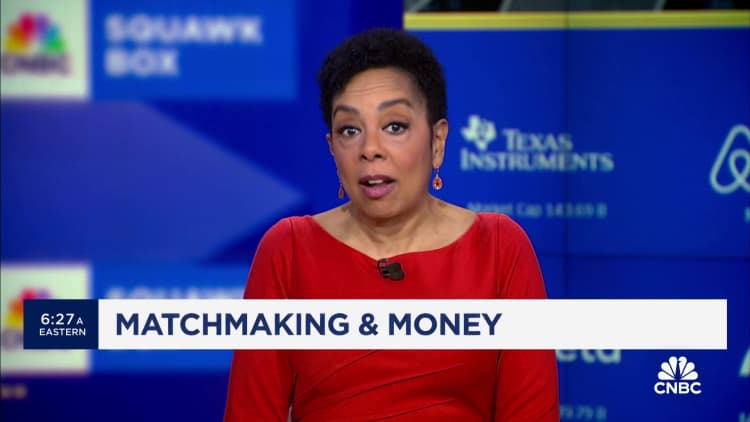
Start-up aimed at solving dating problem
Naza Shelley, an attorney who lives in Washington, D.C., was frustrated using dating apps that she says were not focused on professional Black women — so she built her own. In 2018, she founded CarpeDM, a dating service app that adds a personal touch with a dedicated human matchmaker. Costs range from $300 to $1,800 a year, depending on services and the subscription length.
To initially start her business, she sold her condo, drained her savings and raised money from friends and family.
The start-up received its largest investment in 2022 from Portland, Oregon-based Elevate Capital, a venture capital fund that invests in underrepresented entrepreneurs, which includes women, Blacks, Latinos, other people of color, LGBTQ+ communities, or those with limited regional access to capital.
Couples at a dating event for CarpeDM members at the HQ DC club in Washington, DC.
Stephanie Dhue
“That kind of gave us a pathway to getting our initial capital, which was just so critical because dating apps really have to have funding in order to really get off the ground in a successful way,” Shelley said.
That sizeable capital flow provided more money for marketing, investments in technology and hiring matchmakers. Increasing paid customers and building on relationships with investors has helped the company raise additional funds and gain access to valuable advisors.
“I love the category, it truly brings happiness to people when they can find great matches,” said Steve Kaufer, the founder and former CEO of TripAdvisor, who recently invested in CarpeDM. “When I can find investments where I feel that my experience can add value, those generally become my favorite ones.”
What to consider when investing in a start-up
Addressing racial and gender-based wealth inequality in investment advice prompted Jason Ray to start his own wealth management firm in 2019.
“We find that folks who have ambitious goals and want to achieve a better financial future don’t have access to high-quality advice,” said Ray, president and chief investment officer at Zenith Wealth Partners in Philadelphia.
Many of the firm’s clients are interested in investing in early-stage companies to mitigate stock market volatility and potentially increase overall returns.
Most startup founders initially obtain funding from friends and family. Once a startup begins to solicit funds, funders must be accredited investors. Individuals can generally become accredited with $200,000 annual earned income or $300,000 for married couples. Individuals or couples can also qualify with a total net worth of at least $1 million, not including the value of their primary residence.
If clients want to invest, Ray says it is important to understand the risk — the investment will be “illiquid,” meaning you cannot access that money for many years. And you may never make a profit. According to Harvard Business Review, two-thirds of startups never show a positive return.
To evaluate whether to invest in a startup, Ray says investors should know how the company operates and its competitive advantage. They should evaluate the management team and its track record, and most importantly, understand the terms of the investment.
“If the valuation on the company is too high, and you as an investor are not getting enough rights, or ownership or control or whatever it may be, that may not be the right deal for you,” said Ray.
‘We’re just gonna keep climbing’
Even as startup funding has slowed, Elevate Capital plans to launch a new venture fund in the next few months, expanding its support of diverse entrepreneurs in new regions.
“Just like mountain goats, we’re just gonna keep climbing and we’re gonna just keep doing it,” said Nitin Rai, founder and managing partner of Elevate Capital.
Meanwhile, Ray believes that just like the stock market, early-stage investing also will have its ups and downs. Still, he says, “the graph certainly seems like it’s up and to the right, and people are gonna continue to invest in and support businesses run by Black people and people of color.”
SIGN UP: Join the free virtual CNBC’s Women & Wealth event on March 5th at 1 p.m. ET, where we’ll bring together top financial experts to help you build a better playbook, offer practical strategies to increase income, identify profitable investment opportunities, and save for the future to set yourself up for a stronger 2024 and beyond.
Don’t miss these stories from CNBC PRO:







